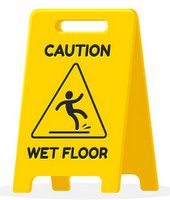 In 1962, Mrs. Gunlock was a guest of the New Frontier Hotel. She tripped and fell her way into Nevada premises liability law for half a decade.
In 1962, Mrs. Gunlock was a guest of the New Frontier Hotel. She tripped and fell her way into Nevada premises liability law for half a decade.
The Supreme Court of Nevada case of Gunlock v. New Frontier Hotel Corp., 78 Nev. 182, 370 P.2d 682 (1962) reported that, Mrs. Gunlock, who was a paying guest of the New Frontier Hotel, entered the dimly lit New Frontier lobby around 10:00 p.m. and walked 30 feet towards an artist painting in the lobby. A two feet wide planter was placed in front of a large plate glass window. The planter was concealed by artificial plants which were two and a half feet high. While Mrs. Gunlock was watching the artist, she turned around and the heel of her high-heel shoes caught the planter box causing her to fall backwards into the artist and sustain injuries. At the close of evidence, the Defendant moved an involuntary dismissal on the grounds the planter was an open an obvious condition. The trial court granted the motion.
Plaintiff appealed to the Supreme Court who affirmed the decision. The Supreme Court’s reasoning was that the size of the planter and the fact that it was neither hidden or concealed meant it should have been observed by a person exercising reasonable care. The “Open and Obvious” doctrine was the law for over five decades and during that time, Nevada courts relied on that doctrine to grant many summary dispositions of Nevada slip or trip and fall cases.
Gunlock remained the rule of law on open and obvious conditions in Nevada until it was overturned by Foster v. Costco Wholesale Corp., 128 Nev. Adv. Op. 71, 291 P.3d 150 (2012). In that case, Mr. Foster was in the paper goods isle of Costco when his left foot caught the corner of a wooden pallet which was covered by a slightly turned box. Foster tripped and sustained injuries. Costco filed a Motion for Summary Judgment citing the Open and Obvious doctrine found in Gunlock.
The court said that the Open and Obvious rule was no longer a basis on which a summary judgment should be granted. The court said:
Here, the district court relied on Gunlock v. New Frontier Hotel, 78 Nev. 182, 370 P.2d 682 (1962), but subsequent development of the open and obvious doctrine compels reversal of summary judgment. Costco is not free from liability under Nevada law solely because the danger of the pallet in its aisle may have been open and obvious to Foster. A jury could reasonably believe that Foster walked down the paper goods aisle without observing the corner of the subject pallet because the corner was obscured by a slightly turned box, which blocked it from his sight. Even if a jury finds the risk to be open and obvious, it must also decide whether Costco nevertheless breached its duty of care to Foster by allowing the conditions to exist and by permitting Foster to encounter those existing conditions; if so, the jury must further determine whether Foster was partially at fault under comparative negligence theories. Accordingly, viewing the evidence in the light most favorable to Foster, we conclude that genuine issues of material fact precluded summary judgment, as material facts remain as to whether Costco exercised reasonable care.
Foster v. Costco Wholesale Corp., 291 P.3d 150, 156-57 (Nev. 2012)
The Court remanded the case, telling the trial court to apply the rule regarding the duty of care found in the Restatement (Third) of Torts:
Restatement (Third) of Torts: Physical and Emotional Harm section 51 (2012):
A land possessor owes a duty of reasonable care to entrants on the land with regard to:
(a) conduct by the land possessor that creates risks to entrants on the land;
(b) artificial conditions on the land that pose risks to entrants on the land;
(c) natural conditions on the land that pose risks to entrants on the land; and
(d) other risks to entrants on the land when any of the affirmative duties … is applicable.
The court reasoned that even if the jury were to have found the risk to have been open and obvious, the jury must also then determine whether Costco breached its duty of care to Foster by allowing the condition to exist and by permitting Foster to encounter those existing conditions.
This change in the law will prevent most if not all Summary Dispositions of slip/trip and fall cases. Following the Foster opinion, slip and fall cases that are not settled will likely end up in trial where the jury will weigh the comparative fault of the parties.
If you have questions on Nevada insurance, bad faith or trucking law, please be sure to contact Mike Mills (mmills@blwmlawfirm.com) or Micah Walker (mwalker@blwmlawfirm.com) at Bauman, Loewe, Witt & Maxwell, 702-240-6060.
 Follow
Follow Email
Email


